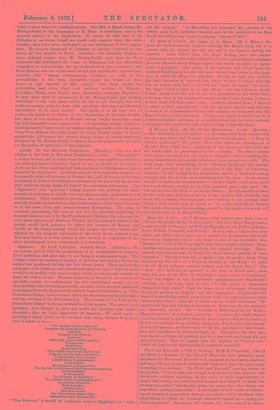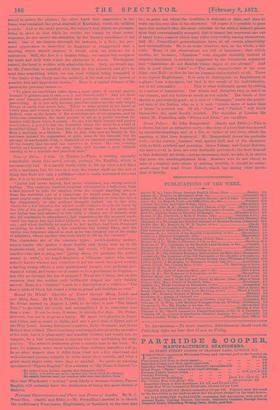Pearl and Emerald: a Tale of Gotham. By R. E.
Francillon. (Smith and Elder.)—Readers of the Cornhill Magazine were probably much perplexed by Pearl and Emerald as it appeared in successive numbers, and they will not be much enlightened when they have the opportunity of reading it as a whole. "In Pearl and Emerald," says the author in his preface, "I have made an attempt to work out certain motives and characters without rejecting, on the score of mere improbability or simple inaccuracy, any incident that seemed best adapted to make the attempt successful ;" and he lays down the axiom that "few things are improbable, nothing impossible." Accordingly we find ourselves witness- ing an animated competition between two dealers for a worthless little oil-painting, in which the biddings ultimately mount up to eighty-five thousand pounds! One dealer bid because the other seemed so deter- mined to secure the picture ; the other knew that somewhere in the frame was contained the great emerald of Kandahar, worth six reilllien pounds. And so the story goes on, the author's real object, we presume, being to show us that while he revolts our reason by these extra- vagances, he can secure our attention by the literary excellence of his work. One of the dealers aforesaid, for instance, is a Jew ; his per- sonal appearance is described in language so exaggerated that a drawing which should express it would seem too hideous for a caricature. Still, the Jew is a human being ; we cannot but recognise the truth and skill -with which his character is drawn. Throughout,
indeed, the book is written with admirable force. Only, we would say, let Mr. Francillon be satisfied with what he has achieved, and give us meat time something which we can read without being reminded of the limits of the likely and the unlikely, of the real and the unreal, of possible fact and improbable fiction." Here is a capital defence of the passion for precious stones:—
" To place an exorbitant value upon .a mere piece of crystal, merely because it glitters and is rare,—is it not obvious folly? And yet there are good reasons, perfectly natural and perfectly human, for such a proceeding. It is not only because precious stones are the only bright things on earth that never fade. There is some poetry at the heart of -every man and woman in the world; even avarice refuses to be prosaic. Indeed, even as the hearts of the avaricious are of set purpose, and by deliberate constraint, the most prosaic of all, so is poetic reaction the harder with them when it comes. To one who finds beauty and poetry everywhere, a jewel is but one beautiful thing the more in a world of beautiful things. It is no less, but at the same time no more, beautiful than a sunbeam or a blossom. But to him who sees no beauty in the sunbeam beyond its suggestion of gold, none in the blossom but its presage of marketable fruit, a diamond or an emerald contains in itself all the beauty that his soul can conceive or desire. He can worship beauty and mammon at the same time, and become a poet without ceasing to be a sensible and practical man."



































 Previous page
Previous page